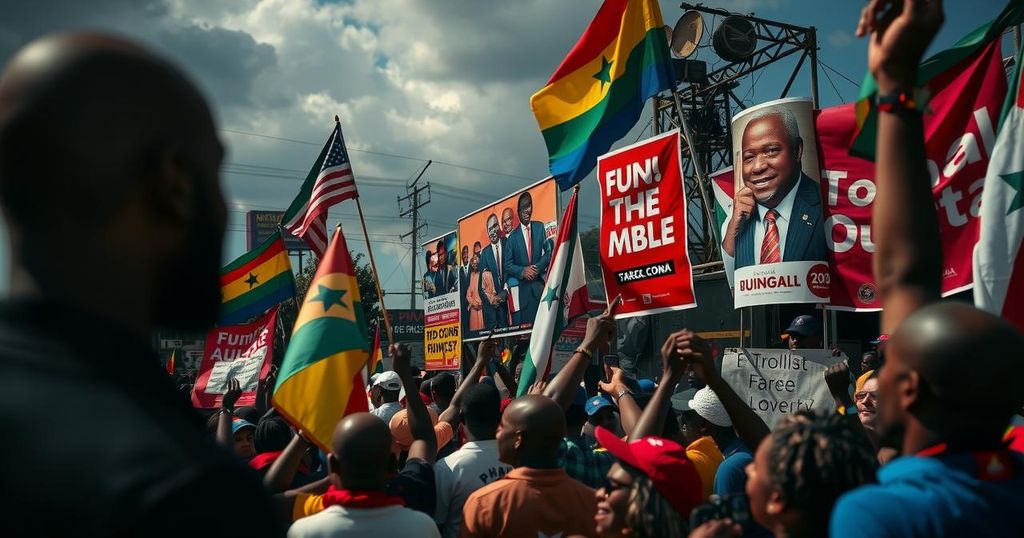Ghana’s December Elections: A Competitive Landscape Amid Economic Challenges

Ghana’s December 7 elections will feature former President John Mahama challenging ruling candidate Vice President Mahamudu Bawumia. Economic recovery after a $30 billion debt default and issues like corruption and job creation dominate voter concerns. Despite the longstanding two-party dominance, there is a notable desire for change among voters, reflecting frustration with the current political systems and a demand for new approaches to governance.
Ghana’s upcoming national elections on December 7 are set to be a highly competitive event, with former President John Mahama positioned as a key contender against the ruling party’s candidate, Vice President Mahamudu Bawumia. Mahama has pledged to create a 24-hour business environment designed to stimulate job creation and rejuvenate an economy that is still recovering from a $30 billion debt default in 2022. In contrast, Bawumia emphasizes his commitment to economic strengthening despite challenges arising from the post-COVID landscape and internal pressures.
Since 1992, Ghana’s political landscape has predominantly featured the National Democratic Congress (NDC) and the New Patriotic Party (NPP). University of Ghana lecturer Kwame Asah Asante remarked on the historical dominance of these parties, noting that smaller parties collectively have failed to secure even 5% of the vote. Nevertheless, he acknowledged that any party achieving more than 4% might precipitate a runoff election.
The vibrant streets of Accra are decorated with candidate billboards, reflecting high voter engagement. Some citizens express a desire for change, voicing fatigue with the longstanding two-party system: “Since 1992 to this year, we haven’t changed parties … we want to change to a different party so that we would see more improvements,” said Angela Ofori, an undecided voter.
New faces in the electoral landscape, such as independent candidate Nana Kwame Bediako, also known as Cheddar, have garnered attention from the youth, despite his limited impact on the election results thus far. His platform includes a commitment to eco-friendly policies aimed at sustainable growth.
Crucial issues dominate this year’s election, not least of which is the economy. Ghana, a leading cocoa producer, encountered severe financial challenges culminating in a debt default in 2022. Factors such as the global impact of COVID-19 and war-induced grain supply disruptions have exacerbated these economic strains. Asante highlighted that issues like infrastructure development, healthcare, education, and unemployment are pivotal in the electoral discussions, with many voters prioritizing economic concerns as essentially “a bread-and-butter issue.”
This sentiment is echoed by Taden, who draws parallels between Ghana’s current inflationary pressures—historically peaking at 54%—and their potential influence on election outcomes, underscoring persistent domestic protests concerning illegal mining practices that have adversely affected the environment and agricultural capacity.
Voter opinions reflect a critical perspective towards the current administration. Wisdom Gavor expressed a desire for Mahama’s economic transformation proposals, emphasizing that a 24-hour economy could significantly increase job opportunities: “So, if the 24-hour economy comes, it’s going to be three shifts.”
Conversely, some voters continue to back Bawumia, acknowledging his substantial contributions through digitization policies that have introduced efficiencies within government operations. Ivan Duke, an NPP supporter, notably commended the administration’s success in creating jobs and modernizing economic processes. Taden corroborated this, acknowledging Bawumia’s initiatives as a catalyst for efficiency improvements in Ghana’s public services.
As Ghana approaches this electoral milestone, observers anticipate a fiercely contested race in a nation recognized for its democratic stability within a region marked by political turbulence. With voter sentiment closely divided and critical issues at stake, the December election is poised to reflect broader economic and social challenges that resonate within the electorate.
Ghana’s political framework has has predominantly been a two-party system since the restoration of multiparty democracy in 1992, primarily between the NDC and the NPP. The country has faced significant economic challenges, particularly with the repercussions of a substantial external debt default in 2022, which was aggravated by global crises such as the COVID-19 pandemic and the war in Ukraine. Voter dissatisfaction with the existing political dynamics has surfaced, nuanced by economic deterioration and environmental concerns stemming from illegal mining activities. As the elections approach, the political discourse is increasingly centered on economic revival, job creation, and governance improvements.
In conclusion, the December elections in Ghana are poised to be a pivotal moment, marked by heightened competitiveness between the old guard and emerging alternatives. Voter dissatisfaction with entrenched party politics, compounded by pressing economic challenges, is driving calls for change. As Mahama and Bawumia present their distinct visions for Ghana’s future, the significance of economic policies will be a determining factor in the electoral outcome. Voter sentiment is increasingly reflective of a desire for transformative approaches to governance that address both immediate economic needs and long-term aspirations for sustainable development.
Original Source: www.voanews.com






